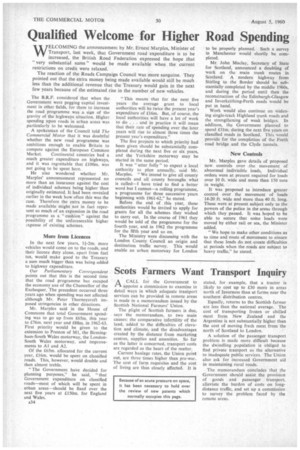Qualified Welcome for Higher Road Spending
Page 68

If you've noticed an error in this article please click here to report it so we can fix it.
WELCOMING the announcement by Mr. Ernest Marples, Minister of Transport, last week, that Government road expenditure is to be increased, the British Road Federation expressed the hope that "very substantial sums" would be made available when the current restrictions on credit were relaxed.
The reaction of the Roads Campaign Council was more sanguine. They pointed out that the extra money being made available would still be much less than the additional revenue that the Treasury would gain in the next few years because of the estimated rise in the number of new vehicles.
The B.R.F. considered that when the Government were pegging capital investment in other fields, for them to increase the road programme was a, sign of the gravity of the highways situation. Higher spending upon roads in urban areas was particularly to be welcomed.
A spokesman of the Council told The Commercial Motor that it was doubtful whether the new road programme was ambitious enough to enable Britain to compete against the European Common
Market. Continental countries had a much greater expenditure on highways, and it was regrettable that £100m. was not going to be spent here.
He also wondered whether Mr. Marples' announcement represented no more than an insurance against the cost of individual schemes being higher than originally estimated. It had been revealed earlier in the week how often this was the case. Therefore the extra money to be made available might not in fact represent so much of an expansion in the road programme as a " cushion " against the possibility of the unforeseeable higher expense of existing schemes.
More from Licences In the next few years, 11-2m. more vehicles would come on to the roads, and their licence duty alone, apart from fuel tax, would make good to the Treasury a sum much bigger than was being added to highway expenditure.
Our Parliamentary Correspondent
points out that this is the second time that the road programme has escaped the economy axe of the Chancellor of the Exchequer. The precedent occurred three years ago when spending was not affected although Mr. Peter Thorneycroft imposed stringencies in other directions.
Mr. Marples said in the House of Commons that total Government spending was to go up from 165m. this year to £76m. next year and £88m. in 1962-63. First priority would be given to the extension to Preston of MI, the Birming. ham-South Wales motorway, the LondonSouth Wales motorway, and improvements to Al and A2.
Of the 165m. allocated for the current year, £16m. would be spent on classified roads. This, however, would double and then almost treble.
"The Government have decided for planning purposes," he said, "that Government expenditure on classified roads—most of which will be spent in urban areas—should be fixed over the next five years at £150m. for England and Wales.
A34 "This means that for the next five years the average grant to local authorities will be twice the present year's expenditure of £16m. But, of course, the local authorities will have a lot of work to do . . and in practice it will mean that their rate of spending over the later years will rise to almost three times the present year's expenditure."
The five projects to which priority had been given should be substantially completed during the next five or six years, and the Yorkshire motorway may be started in the same period.
It was "utter folly" to expect a local authority to plan annually, said Mr. Marples. "We intend to give all county councils and all county boroughs what is called—I have tried to find a better word but I cannot—a rolling programme, a programme for three successive years beginning with 1961-62," he stated.
Before the end of this year, these authorities would be invited to apply for grants for all the schemes they wished to carry out. In the course of 1961 they would be told of the programme for the fourth year, and in 1962 the programme for the fifth year and so on.
The Ministry were discussing with the London County Council an origin and destination traffic survey. This would enable an urban motorway for London to be properly planned. Such a survey in Manchester would shortly be completed.
Mr. John Maclay, Secretary of State for Scotland, announced a doubling of work on the main trunk routes in Scotland. A modern highway from Stirling to the Border should be substantially completed by the middle 1960s, and during the period until then the reconstruction of the Edinburgh-Glasgow and Inverkeithing-Perth roads would be put in hand.
Work would also continue on widening single-track Highland trunk roads and the strengthening of weak bridges. In addition, the Government planned to spend £31m. during the next five years on classified roads in Scotland. This would provide for the completion of the Forth road bridge and the Clyde tunnels.
New Controls
Mr. Marples gave details of proposed new controls over the movement of abnormal indivisible loads. Individual orders were at present required for loads over 10 ft. wide and more than 150 tons in weight.
It was proposed to introduce greater control over the movement of loads 14-20 ft. wide and more than 40 ft. long. These were at present subject only to the powers of the police in the areas through which they passed. It was hoped to be able to secure that some loads were moved by either rail or sea, the Minister added.
"We hope to make other conditions as to time and route of movement to ensure that these loads do not create difficulties at periods when the roads are subject to heavy traffic," he stated.




































































































